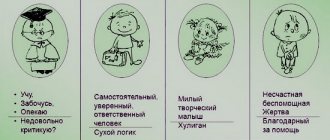Three personality states - parent, adult, child
Why do we sometimes speak to each other as if in different languages? Do we get a response that seems to be not our own response? Or do we unexpectedly react inadequately to innocent remarks? Transactional analysis can answer these questions.
Words play the most insignificant role in communication. The most important thing is the internal mood of each of the participants in the dialogue. Influenced by:
- Our own internal state through the prism of which we perceive communication
- The state of the interlocutor, which we read and react to
Thus, dialogue is always conducted at at least two levels - internal and external. And the main information from it sometimes passes by our consciousness. It is there that the keys to riddles are hidden like: “We were talking calmly, and she suddenly started crying” or “I just asked for help, and he decided that I was accusing him of laziness” and so on.
The answer to how and why this happens is provided by transactional analysis, a psychological model developed by American psychologist Eric Berne. He outlined it in his books on the psychology of relationships: “Games People Play” and “People Who Play Games.”
Three main positions in communication
According to this model, a person always takes a certain position when communicating. And it is she who determines how and to what he will react - and how others will react to him. These positions are called ego states and there are only three of them: parent, adult and child.
- The parent
expresses instilled stereotypes and ideas about life - Adult
– objective and reasonable approach to reality - Child
– spontaneity, creativity and self-expression
A little more detail about each of them.
Ego state "Parent"
The position of a parent is that of an elder. It can be expressed in both negative and positive manifestations. This is care and guardianship, but at the same time - control, coercion and teaching from above. This is a position of “should” and “obligation”, both in relation to oneself and to others. From this state we force ourselves and others to “take and do” something, we teach and explain, and from here we look after, feed, and protect.
A parent is an image of our real parents, which seems to be reflected in the psyche and remains with us forever. Naturally, the properties of this ego state depend on how our real mom and dad behaved with us.
E. Bern gives typical phrases from a parent in his book “Games People Play”: “I know better”, “I’ll explain it to you”, “I’ll help you”, “Who does that?”, “It’s forbidden”, "You must".
Ego state “Child”
Everything here is determined by desires and emotions. This state is characterized by: playful interaction, childish reactions, joy of life, spontaneity, but also fears, resentments and dependence. This is the “I want it, I don’t want it” position, a source of whims and pranks. Spontaneous manifestations, such as creativity, also arise in the child’s state.
A child is a projection of ourselves from childhood. Accordingly, his reactions and positions are the same as ours when we were children.
Typical phrases of a child: “I don’t want”, “I won’t”, “It’s so hard for me”, “Help, I can’t cope”, “You’re always pushing me”, “How wonderful!”, “I want”, “I like it.”
Ego state “Adult”
The position of an adult is the position of common sense, reasonable and adequate interaction. Here a person considers situations and events from the point of view of convenience and benefit, benefit for himself and others, and, importantly, from the position of equality of interlocutors. This is the part of the personality that makes plans, gets results, earns money. As a rule, in this state a person is calm.
This is “our own” part of personality, which is not a projection of us in childhood or a reflection of the image of our parents.
Typical phrases or thoughts: “Let's talk about this”, “I'm sure we'll find the right solution”, “If we go according to plan, we'll most likely work out”, “I believe...”.
How do ego states work?
All three states are very important.
Child functions
– to desire and create pictures of what we want, which will then stimulate us to act; add brightness to life; behave spontaneously and naturally, come up with new things, create, give ideas.
Parent functions
– take care of yourself and others, teach and explain, control what is done, observe social norms and prohibitions, approve and criticize, provide assistance.
Adult functions
– negotiate, adapt, correspond to reality, consider desires, plans and events as a whole from the position of common sense and benefit, act.
For example, how do we achieve our goals? The child sees what he likes and lights up with desire; the adult part evaluates the situation, looks for ways to achieve this, and makes plans. And the parent then controls and tells us - “go ahead, do it, you must”, checks the results, stimulates, reminds. He praises and criticizes, encourages further actions.
Problems of three personality states
The harmonious interaction of our internal ego states ensures the success and prosperity of the individual as a whole - both in business and in relationships. To do this, it is advisable to spend about a third of your time in each of them, effortlessly moving from one to another.
+
Unfortunately, in reality, ego states often function quite differently. One of them may turn out to be excessively strong, the other - suppressed. Most often this concerns the “parent” or “child” states.
Being in such an imbalance, states also “turn on” at the wrong time, forcing a person to behave inappropriately to the situation - for example, being distracted during a work meeting (child) or lecturing her husband when he is not in the mood (parent).
The problem is not only that a person cannot get out of this or that state, but also what kind of state he has. For example, a parent may be too picky, or a child may be fearful or rebellious.
Typical signs of personality imbalance:
- Parent:
criticality, excessive concern for others to the detriment of oneself, hyper-responsibility, inability to rest and relax; - Child:
touchiness, dependence on the opinions of others, irresponsibility, infantilism, inability to concentrate and control oneself, whims.
Let's take a closer look at them.
Parent state problems
Many people know what a harsh inner critic is. For example, you wanted something, and without having time to turn to the adult part of your personality, you immediately “hear” in your head: “Are you crazy?! Where are you!”, “Don’t try it, it’s dangerous!” or even “Fool”, “Loser” and other rude words.
Or another option: a girl began to apply a practice that develops femininity, allowed herself something, bought a beautiful dress, and the critic inside her comments: “Why are you dressed up so much that people will say it’s indecent!”
When we fail at something, it is the parent who scolds us for our failure. Declarative, unsupported beliefs from childhood are also from there.
Another variant of a hypertrophied state, which, as a rule, manifests itself in relation to others, is excessive care and guardianship. This happens especially often in couples when a woman becomes like a mother to a man and cares too much about him.
Important! Let me remind you, just in case, that taking care of yourself and your partner is a normal function of a parent and there is no need to completely abandon it. It is important to maintain balance and be able to switch from one state to another.
Problems of the “child” state
A hypertrophied child is an irresponsible creature who only wants to have fun and have fun, to do what he wants right away. Since there is little control, it is not easy to set big goals: the child only wants to play. Everything is usually fine with desires, but they can constantly change without being fulfilled, because it is difficult for the child to concentrate and pay attention for a long time.
If, on the contrary, there is not enough child in us, we lose the ability to desire, to light up with ideas, to rejoice. A depressed child is a refusal of emotions, which leads to touchiness and demandingness. A person who ignores his childish part is sometimes ready to resist and argue about any issue. To others, this looks like inadequacy, but in fact it is an attempt to balance depressed states.
Touchiness is a typical sign of a rebellious child who always has the feeling that he is being criticized and not appreciated. In fact, it is his own inner parent who criticizes, suppresses and does not appreciate such a person, but it is difficult to realize this. Therefore, pressure is perceived as external. As a result, even the most innocent remarks sound offensive to him. And at the same time, he is constantly waiting for parental support and care, and therefore is very dependent on other people’s opinions, which directly leads us to the topic of self-esteem and its stability.
Swing "Parent-child"
In one and the same personality both the excess of the child and the excess of the parent can coexist, while there is very little room left for the adult. Then a person can be touchy and critical at different moments in life, dependent on other people’s opinions and imposing his own. This is often accompanied by fluctuations in self-esteem and mood - sometimes a perfectionist, sometimes irresponsible; sometimes having fun in the state of a child, sometimes scolding himself for it as a parent.
Problems of the “adult” state
Usually there is only one problem with this condition - there is too little of it. Reasonable and calm behavior and a sound assessment of the situation are not characteristic of everyone. But in reality, each of us is capable of getting into this state - this is a condition for survival. This means that it can be developed and made full-fledged
By observing which of these roles, how and when we dominate – the inner Child, Parent or Adult – we will come closer to the ability to hear ourselves and manage our reactions, behavior, learn to prevent or constructively resolve conflicts in the family, at work, in friendships and love.
After all, each of us is much more than these roles. We are the ones who can consciously manage our roles.
We can become our own directors.
Psychological mirror
The test will help you determine what position you most often occupy and what to do about it.
Test “Parent - Adult - Child” Rate the given statements on a scale from 1 to 10. 1. Sometimes I lack self-control. 2. If my desires interfere with me, then I know how to suppress them. 3. Parents, as more mature people, should arrange the family life of their children. 4. I sometimes exaggerate my role in certain events. 5. It’s not easy to fool me. 6. I would like to be a teacher. 7. Sometimes I want to fool around like a little kid. 8. I think that I correctly understand all the events that are happening. 9. Everyone must do his duty. 10. I often act not as I should, but as I want. 11. When making a decision, I try to think through its consequences. 12. The younger generation should learn from the older how they should live. 13. I, like many people, can be touchy. 14. I manage to see more in people than they say about themselves. 15. Children must unconditionally follow the instructions of their parents. 16. I am a keen person. 17. My main criterion for assessing a person is objectivity. 18. My views are unshakable. 19. It happens that I do not concede in an argument only because I do not want to concede. 20. Rules are justified only as long as they are useful. 21. People must follow the rules regardless of the circumstances. Calculate separately the sum of points for the lines: 1, 4, 7, 10, 13, 16, 19 - “D” (Child); 2, 5, 8, 11, 14, 17, 20 – “B” (Adult); 3, 6, 9, 12, 15,18, 21 – “P” (Parent). Arrange the corresponding symbols in descending order of weight. If you have achieved the “WDR” formula, then you have a developed sense of responsibility, are moderately impulsive, spontaneous and not prone to edification and teaching. You can only wish to preserve these qualities in the future. They will help you in any matter related to communication, teamwork, and creativity. Worse, if “R” comes first, categoricalness and self-confidence are contraindicated, for example, for a teacher, an organizer, in a word, for anyone who mainly deals with people and not with machines. The combination of “RDV” can sometimes complicate the life of the owner of this characteristic. The “parent” cuts the “truth-womb” with childish spontaneity, without doubting anything. “D” at the head of the priority formula is a completely acceptable option, say, for scientific work. Einstein, for example, once jokingly explained the reasons for his scientific success by saying that he developed slowly and thought about many questions only when people usually stopped thinking about them. But childish spontaneity is good up to certain limits. If she begins to interfere with business, then it’s time to take control of your emotions.
So, to summarize, if you
test child parent adult
Other tests for children and adults
Views 322, Today 2
Test "Transactional Analysis of Communication"
E. Berne identifies the following three components of a person’s personality, which determine the nature of communication between people: parental, adult, child.
Parental (Parent - P), which is divided into a caring parental state of the Self, a critical parental state of the Self. The parental Self, consisting of rules of behavior, norms, allows the individual to successfully navigate standard situations, “launches” useful, proven stereotypes of behavior, freeing consciousness from overload with simple, mundane tasks. In addition, the Parental Self ensures with a high probability of success behavior in situations of lack of time for reflection, analysis, and alternate consideration of the possibilities of behavior.
The adult (Adult - B) state of the Self perceives and processes the logical component of information, makes decisions primarily thoughtfully and without emotions, checking their reality. The Adult Self, unlike the Parental Self, promotes adaptation not in standard, unambiguous situations, but in unique ones that require reflection, giving freedom of choice and, at the same time, the need to understand the consequences and responsible decision-making.
The childish (Child - D, or Child) state of the Self follows the life principle of feelings. Behavior in the present is influenced by feelings from childhood. The child's self also performs its own special functions that are not characteristic of the other two components of the personality. It is “responsible” for creativity, originality, relieving tension, receiving pleasant, sometimes “sharp” impressions that are necessary to a certain extent for normal life. In addition, the Child Self comes into play when a person does not feel strong enough to solve problems on his own: he is not able to overcome difficulties and/or withstand the pressure of another person. This self is divided into: the natural child self (spontaneous reactions such as joy, sadness, etc.), the adapting child self (adjusting, subservient, fearful, guilty, hesitant, etc.), the objecting child self.
From the position of a parent, the roles of father, older sister, teacher, and boss are “played”; from the position of an adult - the role of a neighbor, a casual travel companion, a subordinate who knows his own worth, etc.; from the perspective of a child - the role of a young specialist, an artist - a favorite of the public, a son-in-law.
All three components are found in the personality of each person, however, under the condition of poor upbringing, the personality can be deformed so that one component begins to suppress the others, which causes a violation of communication and is experienced by the person as internal tension.
Instances of the Self and typical ways of behaving and speaking
| Instance I | Typical behavior and statements | |
| Parent | Caring parent | Comforts, corrects, helps “We will do this” “Don’t be afraid” “We will all help you” |
| Critical parent | He threatens, criticizes, orders, “Are you late for work again?” “Everyone should have a schedule on their desk!” | |
| Adult | Collects and provides information, assesses probability, makes decisions “What time is it?” “Who could have this letter?” “We will solve this problem in a group” | |
| Child | Spontaneous child | Natural, impulsive, cunning, self-centered behavior “This is the third time this stupid letter has been on my desk” “You did it just great!” |
| Adapting Child | Helpless, fearful, conformist, compliant behavior “I'd love to, but we'll get in trouble.” | |
| Rebellious child | Protesting, challenging behavior “I won’t do that!” “You can’t do this” | |
Each of the states of the Self performs certain functions and, as a result, is vital. Disharmonies and communication disorders are associated either with the suppression of one of them, or with manifestation in situations that it should not control. Psychotherapy, according to E. Bern, should be carried out precisely in this direction: to “revive” a suppressed I-state or teach the actualization of a certain I-state in cases where this is necessary for harmonious communication.
For optimal functioning of the personality, from the point of view of transactional analysis, it is necessary that all three states of the Self are harmoniously represented in the personality.
In order to assess how these three selves are combined in behavior, you can use the following test (scoring the given statements on a scale from 0 to 10).
| ¹ | Statement | Personal assessment of the statement |
| 1 | Sometimes I don't have enough patience | 3 |
| 2 | If my desires interfere with me, then I know how to suppress them | 8 |
| 3 | Parents, as more mature people, should arrange the family life of their children | 3 |
| 4 | I sometimes exaggerate my role in some events | 2 |
| 5 | It's not easy to trick me | 5 |
| 6 | I would love to be a teacher | 2 |
| 7 | Sometimes I want to fool around like a little kid | 3 |
| 8 | I think that I correctly understand all the events that are happening | 6 |
| 9 | Everyone must do their duty | 8 |
| 10 | Often I act not as I should, but as I want | 4 |
| 11 | When making a decision, I try to think through its consequences | 9 |
| 12 | The younger generation should learn from the elders how they should live | 8 |
| 13 | I, like many people, can be touchy | 6 |
| 14 | I manage to see more in people than they say about themselves | 6 |
| 15 | Children must follow their parents' instructions unconditionally | 8 |
| 16 | I am a passionate person | 4 |
| 17 | My main criterion for assessing a person is objectivity | 7 |
| 18 | My views are unshakable | 6 |
| 19 | It happens that I do not concede in an argument only because I do not want to concede | 0 |
| 20 | Rules are only justified as long as they are useful | 9 |
| 21 | People must follow all rules regardless of the circumstances | 1 |
Processing the results
| I-state | Strings to be summed | Sum of points | |
| D | "Child" | 1, 4, 7, 10, 13, 16, 19 | 22 |
| IN | "Adult" | 2, 5, 8, 11, 14, 17, 20 | 50 |
| R | "Parent" | 3, 6, 9, 12, 15, 18, 21 | 48 |
By arranging the corresponding symbols in descending order of weight, we obtain the VFD formula.
Other tests in the “Communication Tests” section
The theory of transactional analysis by E. Berne proceeds from the fact that a transaction is a unit of an act of communication, during which the interlocutors are in one of three states of “I”. In the process of interaction, the following human states may manifest themselves to a greater or lesser extent: the state of “Parent”, “Adult”, “Child”. These conditions accompany a person throughout his life. A mature person skillfully uses different forms of behavior, showing himself flexibly in one state or another depending on his goals and life circumstances. Try to evaluate how you combine these three “I”s in your behavior; for this you can take a test.
Goal: determination of role positions in interpersonal relationships.
Instructions: below are 21 statements, rate the statements from 0 to 10.
- Sometimes I don't have enough patience.
- If my desires interfere with me, then I know how to suppress them.
- Parents, as older people, must arrange the family life of their children.
- I sometimes exaggerate my role in certain events.
- It's not easy to trick me.
- I would love to be a teacher.
- Sometimes I want to fool around like a little kid.
- I think that I understand all the events that are happening correctly.
- Everyone must do their duty.
- Often I do what I shouldn’t do, but what I want.
- When making a decision, I try to think about its consequences.
- The younger generation should learn from the elders how they should live.
- I, like many people, can be touchy.
- I manage to see more in people than they say about themselves.
- Children must unconditionally follow their parents' instructions.
- I am a fascinating person.
- My main criterion for assessing a person is objectivity.
- My views are unshakable.
- It happens that I do not concede in an argument only because I do not want to concede.
- Rules are justified as long as they are useful.
- People must follow the rules no matter the circumstances.
Key to the Test Transactional Analysis E. Berne (Test child, adult, parent). Role positions in interpersonal relationships according to E. Berne
1 (child state): 1, 4, 7, 10, 13, 16, 19.
2 (adult state): 2, 5, 8, 11, 14, 17, 20.
3 (parent state): 3, 6, 9, 12, 15, 18, 21.
Instructions: separately calculate the sum of points for the lines. Next, you have an interpretation. Let's consider the following three components of a person's personality, which determine the nature of communication between people: Parental, Adult, Child.
Interpretation:
- The childish (Child - D, or Child) state of the Self follows the life principle of feelings. Behavior in the present is influenced by feelings from childhood. The child's self also performs its own special functions that are not characteristic of the other two components of the personality. It is “responsible” for creativity, originality, relieving tension, receiving pleasant, sometimes “sharp” impressions that are necessary to a certain extent for normal life. In addition, the Child Self comes into play when a person does not feel strong enough to solve a problem on his own: he is not able to overcome difficulties and/or resist the pressure of another person. This self is divided into: the natural child self (spontaneous reactions such as joy, sadness, etc.), the adapting child self (adjusting, subservient, fearful, guilty, hesitant, etc.), the objecting child self.
Signs of ego state actualization: Ego state of the Child
Verbal signs: a) exclamation: here you go!, wow!, God!, damn it!; b) words of the egocentric circle: I want, I can’t, but what does it matter to me, I don’t know and I don’t want to know, etc.; c) appeal to others: help me, you don’t love me, you will feel sorry for me; d) self-deprecating expressions: I’m a fool, nothing works out for me, etc.
Appeal You – You and You – You.
Behavioral (non-verbal) signs: involuntary shivering, fidgeting, shrugging, shaking hands, blushing, rolling eyes, downcast gaze, looking up; pleading, whining intonation, fast and loud voice, angry and stubborn silence, teasing, gloating, excitement, etc.
- The adult (Adult - B) state of the Self perceives and processes the logical component of information, makes decisions primarily thoughtfully and without emotions, checking their reality. The Adult Self, unlike the Parental Self, promotes adaptation not in standard, unambiguous situations, but in unique ones that require reflection, giving freedom of choice and, at the same time, the need to understand the consequences and make responsible decisions.
Signs of ego-state actualization: Ego-state Adult
Verbal signs: the statement expresses an opinion, not a categorical judgment, expressions like: thus, probably, relatively, comparatively, expediently, alternative, in my opinion, as far as possible, let's look at the reasons, etc.
Appeal You – You and You – You.
Behavioral (non-verbal) signs: straight posture (but not frozen); the face is turned to the interlocutor, open, interested: natural gestures in conversation; eye contact at the same level; the voice is intelligible, clear, calm, even, without excessive emotions.
- The parental (Parent - P) state of the Self is divided into a caring parental state of the Self, a critical parental state of the Self. The parental Self, consisting of rules of behavior, norms, allows the individual to successfully navigate standard situations, “launches” useful, proven stereotypes of behavior, freeing consciousness from overload with simple, routine tasks. In addition, the Parental Self ensures with a high probability of success behavior in situations of lack of time for reflection, analysis, and alternate consideration of the possibilities of behavior.
Signs of ego-state actualization: Ego-state Parent
Verbal signs – words and expressions like: a) must, cannot, never, must, because I said so, don’t ask questions what people will think (say); b) value judgments: stubborn, stupid, insignificant, poor, smart, excellent, capable.
Address You - You (I am addressed as YOU, I am addressed as You).
Behavioral (non-verbal) signs: pointing gesture (accusation, threat), raised finger, patting on the back, cheek; authoritarian postures (hands on hips, crossed on chest), looking down (head thrown back), banging on the table, etc.; the tone of the voice is mocking, arrogant, accusing, patronizing, sympathetic.
Combinations of ego states. To do this, return to the table with points. Arrange the corresponding symbols in descending order of weight (depending on the number of points scored), we get the formula. For optimal functioning of the personality, from the point of view of E. Bern, it is necessary that all three states of the self are harmoniously represented in the personality. A mature person skillfully uses different forms of behavior, as long as they are appropriate. Self-control and flexibility help him return to the “Adult” state in time, which, in fact, distinguishes a mature personality from a youth, even one of advanced age.
Formulas:
- If you get the formula 2, 1, 3, or VDR, then this means that you have a sense of responsibility, are moderately impulsive and are not prone to edification.
- If you have obtained formula 3, 1, 2, or RDV, then you are characterized by categorical judgments and actions, perhaps excessive expression of self-confidence when interacting with people, most often say without a doubt what you think or know, without caring about the consequences of your words and actions.
- If the first place in the formula is state 1 or state D (child), then you may show a penchant for scientific work, although you do not always know how to manage your emotions.
Bern's test. Determination of role positions in interpersonal relationships
Bern's test
| Full name of the person being assessed | ____________________________________________ |
| Age (full years) | ____________________________________________ |
| Job title | ____________________________________________ |
| Subdivision | ____________________________________________ |
| Date of completion | ____________________________________________ |
Instructions
Try to evaluate how these three “I”s combine in your behavior. To do this, rate the given statements on a scale from 0 to 10.
Test
| № | Statement | Grade |
| 1 | Sometimes I don't have enough patience | |
| 2 | If my desires interfere with me, then I know how to suppress them | |
| 3 | Parents, as older people, should arrange the family life of their children | |
| 4 | I sometimes exaggerate my role in certain events | |
| 5 | It's not easy to trick me | |
| 6 | I would love to be a teacher | |
| 7 | Sometimes I want to fool around like a little kid | |
| 8 | I think I understand all the events that are happening correctly | |
| 9 | Everyone must do their duty | |
| 10 | Often I act not as I should, but as I want | |
| 11 | When making a decision, I try to think through its consequences | |
| 12 | The younger generation should learn from the elders how they should live | |
| 13 | I, like many people, can be touchy | |
| 14 | I manage to see more in people than they say about themselves | |
| 15 | Children must follow their parents' instructions unconditionally | |
| 16 | I am a passionate person | |
| 17 | My main criterion for assessing a person is objectivity | |
| 18 | My views are unshakable | |
| 19 | It happens that I do not concede in an argument only because I do not want to concede | |
| 20 | Rules are only justified as long as they are useful | |
| 21 | People must follow all rules regardless of the circumstances |
Thanks for answers!
Key to the test for determining role positions in Bern's interpersonal relationships
Description
Berne's test is designed to determine role positions in interpersonal relationships.
E. Berne's theory of transactional analysis proceeds from the fact that a transaction is a unit of an act of communication, during which the interlocutors are in one of three “I” states.
In the process of interaction, the following human states can manifest themselves to a greater or lesser extent: the state of “parent”, “adult”, “child”. These three states accompany a person throughout his life.
A mature person skillfully uses different forms of behavior, showing himself flexibly in one state or another depending on his goals and life circumstances.
Key to the test
I (“child” state): 1, 4, 7, 10, 13, 16, 19.
II (adult state): 2, 5, 8, 11, 14, 17, 20.
III (parent state): 3, 6, 9, 12, 15, 18, 21.
Interpretation of the result
Calculate the total points by row separately.
The parental (Parent - P) state of “I” is divided into a caring parental state of “I”, a critical parental state of “I”. The parental “I”, consisting of rules of behavior and norms, allows the individual to successfully navigate standard situations, “launches” useful, proven stereotypes of behavior, freeing consciousness from the burden of simple, everyday tasks. In addition, the Parental “I” ensures with a high probability of success behavior in situations of lack of time for reflection, analysis, and alternate consideration of behavioral possibilities.
The adult (Adult - B) state of “I” perceives and processes the logical component of information, makes decisions primarily thoughtfully and without emotions, checking their reality. The adult “I,” unlike the Parental “I,” promotes adaptation not in standard, unambiguous situations, but in unique ones that require reflection, giving freedom of choice and, at the same time, the need to understand the consequences and responsible decision-making.
The childish (Child - D, or Child) state of the “I” follows the life principle of feelings. Behavior in the present is influenced by feelings from childhood. The child's “I” also performs its own special functions that are not characteristic of the other two components of the personality. It is “responsible” for creativity, originality, relieving tension, receiving pleasant, sometimes “sharp” impressions that are necessary to a certain extent for normal life. In addition, the Child “I” comes onto the scene when a person does not feel enough strength to solve problems on his own: he is not able to overcome difficulties and/or resist the pressure of another person. This “I” is divided into: the natural child “I” (spontaneous reactions such as joy, sadness, etc.), the adapting child “I” (adjusting, subservient, fearful, guilty, hesitant, etc.), the objecting child "I".
Signs of actualization of various ego states
1. Ego state “child”.
Verbal signs:
a) exclamations: “here you go!”, “wow!”, “God!”, “damn it!”;
b) words of the egocentric circle: “I want”, “I can’t”, “what do I care”, “I don’t know and I don’t want to know”, etc.;
c) addressing others: “help me”, “you don’t love me”, “you will regret”;
d) self-deprecating expressions: “I’m a fool”, “I can’t do anything”, etc.
Appeal “You – you” and “you – you”.
Behavioral (non-verbal) signs: involuntary shivering, fidgeting, shrugging, shaking hands, blushing, rolling eyes, downcast gaze, looking up; pleading intonation, whining, fast and loud voice, angry and stubborn silence, teasing, gloating, excitement, etc.
2. Ego state “adult”.
Verbal signs: the statement expresses an opinion, and not a categorical judgment, expressions such as “thus”, “probably”, “relatively”, “comparatively”, “advisable”, “alternative”, “in my opinion”, “as far as possible” are used. perhaps”, “let’s look at the reasons”, etc.
Appeal “You – You” and “You – You”.
Behavioral (non-verbal) signs: straight posture (but not frozen); the face is turned to the interlocutor, open, interested; natural gestures in conversation; eye contact at the same level as the partner; the voice is intelligible, clear, calm, even, without excessive emotions.
3. Ego state “parent”.
Verbal signs – words and expressions like:
a) “must”, “impossible”, “never”, “obliged”, “because I said so”, “don’t ask questions”, “what people will think (say)”;
b) value judgments: “stubborn”, “stupid”, “insignificant”, “poor fellow”, “clever”, “excellent”, “capable”.
Address “you - you” (I am addressed as “You”, I am addressed as “you”).
Behavioral (non-verbal) signs: pointing gesture (accusation, threat), raised finger, patting on the back, cheek; authoritarian postures (hands on hips, crossed on chest), looking down (head thrown back), banging on the table, etc.; the tone of voice is mocking, arrogant, accusing, patronizing, sympathetic.
A mature person skillfully uses different forms of behavior, as long as they are appropriate. Self-control and flexibility help him return to an “adult” state in time, which, in fact, distinguishes a mature personality from a youth, even one of advanced age.
Combinations of ego states
By arranging the corresponding symbols in descending order of weight (depending on the number of points scored), we obtain the formula. For optimal functioning of the personality, from the point of view of E. Bern, it is necessary that all three states of the “I” be harmoniously represented in the personality.
If you get formula II, I, III, or VDR, then this means that you have a sense of responsibility, are moderately impulsive and are not prone to edification and teaching.
If you have obtained formula III, I, II, or RDV, then you are characterized by categoricalness in judgments and actions, perhaps excessive expression of self-confidence when interacting with people, most often say without a doubt what you think or know, without caring about the consequences your words and actions.
If the first place in the formula is state I, or D-state (“child”), then you may show a penchant for scientific work, although you do not always know how to control your emotions.











